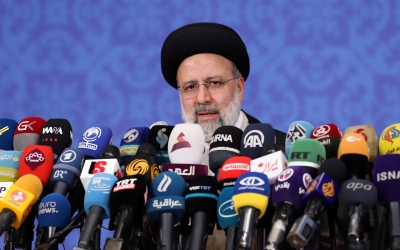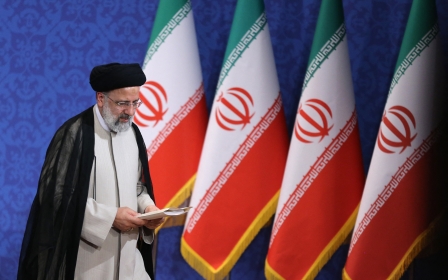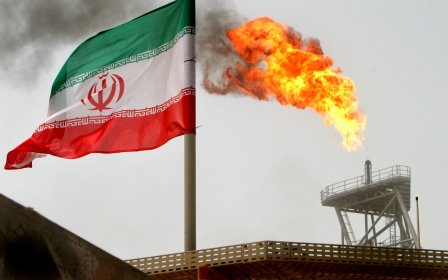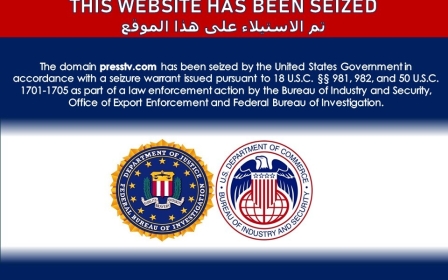Raisi's election victory does not affect Iran deal diplomacy: US official
Ebrahim Raisi's victory in the Iranian election will not affect Washington's push to renew the nuclear deal with Tehran, a senior US State Department official said on Thursday.
The official called the election of the ultraconservative Iranian judiciary chief a "pre-manufactured process".
Still, he said the identity of the president in Tehran did not change America's "core national security interest" of reaching an agreement that contained Iran's nuclear programme.
"From our point of view, it does not affect our determination to try to reach a deal or the pace at which we will go about pursuing it," said the official, speaking to reporters on condition of anonymity.
Raisi's election coincided with the sixth round of indirect talks in Vienna to revive the deal.
New MEE newsletter: Jerusalem Dispatch
Sign up to get the latest insights and analysis on Israel-Palestine, alongside Turkey Unpacked and other MEE newsletters
Iran's Guardian Council is a constitutional authority with six members appointed by the country's supreme leader and six elected by the country's parliament from a list of nominees selected by Iran's chief justice - who is himself also appointed by the the supreme leader.
Among other wide-ranging powers, the council determines who can stand for national office, and had barred all of Raisi's serious competitors - including some conservative candidates - from running, effectively handing him victory.
The Iranian president-elect, who takes office on 3 August, is under US sanctions for involvement in a mass execution campaign that killed thousands of dissidents in Iran in 1988.
Raisi comes from the camp of Iranian hardliners who are sceptical of engagement with the US.
Reviving JCPOA is 'possible'
On Thursday, the US official reiterated previous remarks made by aides to President Joe Biden, stressing that Supreme Leader Ali Khaminei - not the Iranian president - had the final word on nuclear issues in Iran, "and that position, that person, has not changed".
The American official did not provide a timeline as to when the deal may be restored. He said some "important issues" still needed to be resolved, and "nothing is agreed until everything is agreed".
"By the same token, we wouldn't be going back for a seventh round [of talks] if we didn't think that it was possible; it remains possible; that remains our objective, but we're not there yet."
A date for the seventh round of negotiations has not been set, the official said.
The 2015 multilateral deal, known as the Joint Comprehensive Plan of Action (JCPOA), granted Iran relief from international sanctions in exchange for scaling back its nuclear programme.
Former US President Donald Trump nixed the deal in 2018 and started a "maximum pressure" campaign of sanctions against Iran.
In response, Iran started enriching uranium beyond the limits set by the agreement.
The Biden administration says it is seeking a return to the deal followed by negotiations to make the JCPOA "longer and stronger", as well as talks over broader issues with Tehran, including the Iranian ballistic missile programme and its support for armed groups in the region.
No guarantees
One issue that may affect Iran's position towards negotiations is that a future American president can withdraw from the deal, with Republicans and some hawkish Democrats in Congress already voicing opposition to restoring the JCPOA.
On Thursday, the State Department official said there was no guarantee that a revived agreement would withstand the internal politics of either country in the long run.
"What we do think is that the best guarantee is to get back into the deal and implement it faithfully," he said.
Earlier on Thursday, Mikhail Ulyanov, the Russian diplomat representing Moscow at the Vienna talks, suggested that the fallout from Washington's withdrawal from the agreement in 2018 would deter a future nixing of a revived JCPOA.
"Many followers ask if there is a guarantee that US wouldn't leave #JCPOA after its restoration," Ulyanov wrote on Twitter.
"To my mind the best guarantee is extremely negative experience of the past. If #US repeats the previous mistake #Iran may decide to reciprocate even tougher. Nobody would like it."
Middle East Eye delivers independent and unrivalled coverage and analysis of the Middle East, North Africa and beyond. To learn more about republishing this content and the associated fees, please fill out this form. More about MEE can be found here.





